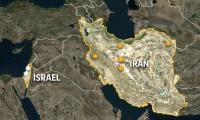Districts in decay
Of the three tiers of government in Pakistan the lowest one is the revenue/administrative districts. This, sadly, also remains the lowest priority in the allocation of state resources or in strengthening its capacity to deal with everyday issues. Unsurprisingly, districts today are deprived and decaying fast.
It is in the districts that the people of the country live and that is where they need to be provided for. The telltale signs of decay are visible in the pot-marked roads and crumbling buildings – and even more so in the poor availability of mandated state services. Courts, police stations, land revenue offices, schools and health units generally offer suboptimal services. They are little more than empty decrepit shells. The default in the municipal services – like the provision of drinking water, functioning sewerage grid and garbage collection – are visible to all but the blind. The blind, seemingly, are those who really matter.
All these are provincial responsibilities under the constitution. Traditionally, the federal government tightly held the reins of authority, power and purse strings. The 18th Amendment to the constitution diluted the federation’s hold to an extent as the provincial oligarchs succeeded in wresting considerable financial and administrative power from the former. There was hope that administrative decentralization and financial apportionment to the districts would follow but that did not materialize. There is little evidence on the ground of the required devolution of resources to the deprived districts after the seventh Finance Commission Award. Were provincial finance commissions established, less developed districts such as those in southern Punjab and Khyber Pakhtunkhwa, southern and central Balochistan and northern and eastern Sindh would have received a fairer share of the resources available to the provinces. The Bahawalpur region was amongst the worst affected; it first lost the river waters of Sutlej-Bias and then received less than its share of provincial resources.
Today, the districts are silent spectators with a duty to only vote this or that party to power. In a further twist, Peshawar and Quetta suffered even more due to the disturbed conditions compelling the wealthy few and industrialists to move to Islamabad, Lahore and Karachi. Consequently, +employment opportunities fell. (Incidentally, it would help to locate one each of the six new car assembly plants in KP, DG Khan and Balochistan through provision of generous incentives by the provincial governments).
As stated above, state intervention and responsibilities towards the people occurs only in the districts. The district is responsible for providing peace and security, maintaining social order, ensuring sectarian and communal harmony, resolving property and rights-related disputes, ameliorating minorities, comforting the exploited and helpless women and children, assisting the collection of local, provincial and federal taxes and revenues, facilitating the efficient functioning of health, education and other line departments, conserving forests and wildlife and importantly protecting all state assets. The district alone can provide prompt relief to those affected by earthquakes, fires, floods, pestilence, the weak, harassed women and children often at the hands of their own families or local roughnecks.
The response of service providers towards the common people is depressing. The ‘thana’ or the police station does not provide security much less relief as even FIR filing is discretionary and requires influence or money and often both. The ‘patwar’, the land registry, provides the setting for agonizing those with some property but little social position. The ‘kachery’ established to dispense justice is a law onto itself, mindful only of its privileges till the new Model Courts arrive. The district prison is where the weak and meek exist after being adjudged or presumed guilty and the incarcerated survive at the mercy of jailers who enjoy absolute powers over inmates’ pockets, bodies and dignity.
Public-sector schools remain pathetic as furniture, teaching material and utilities remain scant. Little wonder then that the literacy ratio still remains shamefully under sixty percent. Even this rate fell by two percent last year. Bangladesh has 99 percent of its children in school, while in Pakistan the figure is said to be 80 percent. The 21st century is reserved for the fittest only; there will be little opportunity for those armed with obsolete degrees. (The Society for the Promotion of Engineering Sciences and Technology, which owns and manages the Ghulam Ishaq Khan Institute of Science & Technology, recently offered all provincial governments to adopt some of these so-called ‘universities’. No response was received). The healthcare system and the municipal services remain similarly deprived.
Moreover, development resources could have been conserved by focusing on urgently needed priorities away from grandiose monuments like costly urban metros and grand public structures. The Peshawar, Lahore and Islamabad metros could have been more functionally and frugally developed to save most of their costs.
There appear to be two main causes for the neglect in the districts. One, provision of inadequate non-salary resources to the districts for meeting basic human needs and, two, absence of enabling laws for promptly resolving grievances relating to security of life, liberty and property. We have seen too much money lost in the unproductive exercise of creating many unnecessary districts over the past three decades. Khyber Pakhtunkhwa had seven districts in 1970 and now has 25; Sindh and Balochistan are similar. Establishment of new districts is irrelevant to the needs of the people during these days of quick transportation and speedy telecommunication. This money could have been more profitably invested in providing services such as functional school and health units, water and sanitation and in funding urgently needed resources for police stations, courts and line departments’ supplies.
It is hoped that a new local government system would provide for an effective and directly elected district nazim/mayor with responsibilities for provision of services to ensure that the existing government assets are productively utilized. In the past, the deputy commissioner was able to resolve local grievances and provide prompt executive relief by virtue of his powers as district magistrate. Those enabling laws, for the most part, are no longer available after General Musharraf’s tampering with district functioning. The devolution setup abolished the magisterial cushion with the result that the primary contact point between the state’s civil administration and the aggrieved public often becomes the first flash point.
No impartial authority is now available to lend a shoulder to the grieving or enraged public to cool tempers and seek remedies. Instead, the aggrieved immediately come face to face with heavily armed uniformed forces. Many tragic incidents could have had different consequences had the magisterial dialogue option been available to the state. A trusted cushion without rifles remains indispensable to absorb the hurt and vengeful spirit of the aggrieved.
The writer has served as the chief secretary of GB, AJK, KP and Sindh and was the chairman of Wapda and the Pakistan Railways.
Email: markhornine@gmail.com
-
 Nvidia’s New Specialized Chip Aims To Accelerate AI Processing Speeds
Nvidia’s New Specialized Chip Aims To Accelerate AI Processing Speeds -
 Demi Moore Was Left With ‘intense’ Illness After ‘The Substance’
Demi Moore Was Left With ‘intense’ Illness After ‘The Substance’ -
 How AI Can Read Your Thoughts Without You Speaking?
How AI Can Read Your Thoughts Without You Speaking? -
 Elon Musk’s Grok Faces Scrutiny From Federal Agencies Amid Pentagon-Anthropic Standoff–Here’s Why
Elon Musk’s Grok Faces Scrutiny From Federal Agencies Amid Pentagon-Anthropic Standoff–Here’s Why -
 ‘I Saw Nothing’: Bill Clinton Denies Knowledge Of Epstein’s Crimes In House Testimony
‘I Saw Nothing’: Bill Clinton Denies Knowledge Of Epstein’s Crimes In House Testimony -
 Jim Carrey Makes Surprising Confession About Rarely Seen Girlfriend Min Ah
Jim Carrey Makes Surprising Confession About Rarely Seen Girlfriend Min Ah -
 How Michael J. Fox Helped Harrison Ford With His Parkinson's Monologue
How Michael J. Fox Helped Harrison Ford With His Parkinson's Monologue -
 AI Safety Battle: Anthropic Fires Back At Pentagon After US Military Flags It ‘supply Chain Risk’
AI Safety Battle: Anthropic Fires Back At Pentagon After US Military Flags It ‘supply Chain Risk’ -
 OKC Vs Nuggets: NBA MVP Shai Gilgeous-Alexander Scores 36 In Fiery Overtime Win
OKC Vs Nuggets: NBA MVP Shai Gilgeous-Alexander Scores 36 In Fiery Overtime Win -
 Eric Dane's Biggest Regret Comes To Light Following Days Of His Death
Eric Dane's Biggest Regret Comes To Light Following Days Of His Death -
 Israel Launches Attack On Iran's Capital And Declares State Of Emergency
Israel Launches Attack On Iran's Capital And Declares State Of Emergency -
 At Least 15 Dead After Military Plane Carrying New Banknotes Plunges Out Of Control In Bolivia
At Least 15 Dead After Military Plane Carrying New Banknotes Plunges Out Of Control In Bolivia -
 OpenAI Partners With Pentagon After Trump Bans Anthropic AI
OpenAI Partners With Pentagon After Trump Bans Anthropic AI -
 Trump Orders Federal Agencies To Stop Using Anthropic AI Tools
Trump Orders Federal Agencies To Stop Using Anthropic AI Tools -
 Shocking Details Emerge In Martin Short’s Daughter Katherine's Death Investigation: 'Kept To Herself'
Shocking Details Emerge In Martin Short’s Daughter Katherine's Death Investigation: 'Kept To Herself' -
 Daniel Serafini Gets Life Without Parole In In-laws Murder And Attempted Murder Case
Daniel Serafini Gets Life Without Parole In In-laws Murder And Attempted Murder Case



